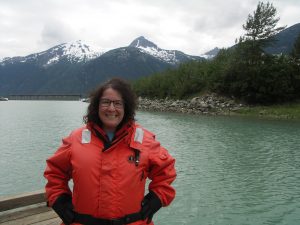February 7, 2019
An Oceanographer’s Journey: Meet Dr. Laura Guertin, Professor of Earth Science
Posted by AGU Career Center
 This Paths Through Science profile features Dr. Laura Guertin, a Professor of Earth Science at Penn State Brandywine, and the exciting path that led her to a career as a professional geoscientist.
This Paths Through Science profile features Dr. Laura Guertin, a Professor of Earth Science at Penn State Brandywine, and the exciting path that led her to a career as a professional geoscientist.
Unlike the stories many professional scientists tell about how they developed a passion for science at an early age, Dr. Guertin did not dream of becoming a scientist when she was growing up. In fact, she didn’t know any scientists and she never actually met a professional scientist in person. She didn’t consider a future career in the sciences until the 11th grade when she was encouraged by her fantastic chemistry teacher to follow her talents. Ever since then, Dr. Guertin, who is now a Professor of Earth Science at Penn State Brandywine, has remained passionate about the field of science and enjoys the excitement of life as a geoscientist.
When Dr. Guertin took her first course in geology, she knew she wanted to become a geologist. She developed a strong interest in studying the ocean, but her undergraduate institution did not offer any oceanography courses. Dr. Guertin didn’t let that stop her from learning more about marine science. She sought out opportunities to gain experience in the oceanography field by partaking in several off-campus research, internship, and course opportunities with different institutions. An issue that posed challenges for her as an undergraduate involved a couple of her STEM professors who were harsher on female students than male students, claiming that their discouraging attitudes would “toughen” them up for life as female scientists after graduation. Dr. Guertin also recalls having only one female professor throughout all her STEM classes. Although she was able to persist and succeed in her science courses, she believes that this lack of equality could have discouraged other students from pursuing STEM degrees.
On the first day of her doctorate orientation in marine geology and geophysics at the University of Miami, Hurricane Andrew hit the region, causing a physical and emotional toll. “I was living out of my car and sleeping on someone’s water-damaged couch until I could find a place to live, while classes were going on…,” she recalls. Fortunately, Dr. Guertin found support which helped her overcome these challenges. “My department was very supportive, and I worked with faculty and staff that absolutely shaped me into the researcher and instructor I am today,” she said.
After completing her Ph.D., Dr. Guertin was faced with the difficult choice of deciding whether she wanted to pursue a career in industry or academia. She first worked in a temporary position as an undergraduate instructor to find out if she enjoyed working with students and was able to balance her work as a teacher and a researcher. She ended up loving this role, and soon landed a position as a Professor at Penn State Brandywine, where she has taught Earth Science since 2001. She takes great pride in being a professor and the contributions she makes to the scientific community. “Knowing that my work has advanced our body of knowledge in everything from ocean science to ocean teaching is what I’m most proud of in being a scientist.”
Although she thoroughly enjoys spending time in the classroom with her students, she finds it tough to get out in the field for research with so many administrative responsibilities. She overcomes this challenge by making time to participate in field seminars, attend conferences, and serve on committees at the national level to remain connected with other geoscience professionals and continue learning about the latest scientific news. She also takes advantage of opportunities to promote the advancement of science by participating in outreach programs and mentoring rising scientists. “It is a balancing act to achieve and maintain as one advances through their career… but the key is to find ways to participate in activities that bring personal reward while satisfying the evolving job requirements,” she said.
Since Dr. Guertin found that participating in research and other educational opportunities off-campus as an undergraduate were influential experiences that further exposed her to work in the field that she was interested in pursuing, she encourages all students to seek out unique opportunities to “study away” during summers or the semester in effort to gain new skills and discover their academic passions. She also recommends that all students take advantage of opportunities to develop their writing, speaking, and listening skills, as she has found these skills to be of utmost importance to her roles as an educator and researcher. Lastly, she encourages all scientists to be kind to everyone they meet throughout their endeavors- a smile and thank you go a long way. “All [people] are deserving of an acknowledgement and respect for what they do, so we scientists can do our job.”
Sarah Dieck, Winter 2019 Talent Pool Intern, American Geophysical Union


 On the Job is an AGU blog, that provides career advice and workforce guidance to geoscience students, early-career and established professionals who are interested in pursuing professional enrichment.
On the Job is an AGU blog, that provides career advice and workforce guidance to geoscience students, early-career and established professionals who are interested in pursuing professional enrichment.